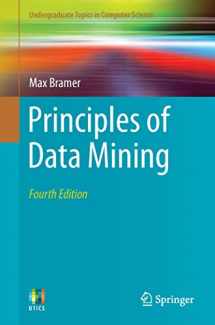
Principles of Data Mining (Undergraduate Topics in Computer Science)
Book details
Summary
Description
This book explains and explores the principal techniques of Data Mining, the automatic extraction of implicit and potentially useful information from data, which is increasingly used in commercial, scientific and other application areas. It focuses on classification, association rule mining and clustering.
Each topic is clearly explained, with a focus on algorithms not mathematical formalism, and is illustrated by detailed worked examples. The book is written for readers without a strong background in mathematics or statistics and any formulae used are explained in detail.
It can be used as a textbook to support courses at undergraduate or postgraduate levels in a wide range of subjects including Computer Science, Business Studies, Marketing, Artificial Intelligence, Bioinformatics and Forensic Science. As an aid to self-study, it aims to help general readers develop the necessary understanding of what is inside the 'black box' so they can use commercial data mining packages discriminatingly, as well as enabling advanced readers or academic researchers to understand or contribute to future technical advances in the field.
Each chapter has practical exercises to enable readers to check their progress. A full glossary of technical terms used is included.
Principles of Data Mining includes descriptions of algorithms for classifying streaming data, both stationary data, where the underlying model is fixed, and data that is time-dependent, where the underlying model changes from time to time - a phenomenon known as concept drift.
The expanded fourth edition gives a detailed description of a feed-forward neural network with backpropagation and shows how it can be used for classification.
From the Back Cover
This book explains and explores the principal techniques of Data Mining, the automatic extraction of implicit and potentially useful information from data, which is increasingly used in commercial, scientific and other application areas. It focuses on classification, association rule mining and clustering.
Each topic is clearly explained, with a focus on algorithms not mathematical formalism, and is illustrated by detailed worked examples. The book is written for readers without a strong background in mathematics or statistics and any formulae used are explained in detail.
It can be used as a textbook to support courses at undergraduate or postgraduate levels in a wide range of subjects including Computer Science, Business Studies, Marketing, Artificial Intelligence, Bioinformatics and Forensic Science. As an aid to self-study, it aims to help general readers develop the necessary understanding of what is inside the 'black box' so they can use commercial data mining packages discriminatingly, as well as enabling advanced readers or academic researchers to understand or contribute to future technical advances in the field.
Each chapter has practical exercises to enable readers to check their progress. A full glossary of technical terms used is included.
Principles of Data Mining includes descriptions of algorithms for classifying streaming data, both stationary data, where the underlying model is fixed, and data that is time-dependent, where the underlying model changes from time to time - a phenomenon known as concept drift.
The expanded fourth edition gives a detailed description of a feed-forward neural network with backpropagation and shows how it can be used for classification.


We would LOVE it if you could help us and other readers by reviewing the book
Book review



